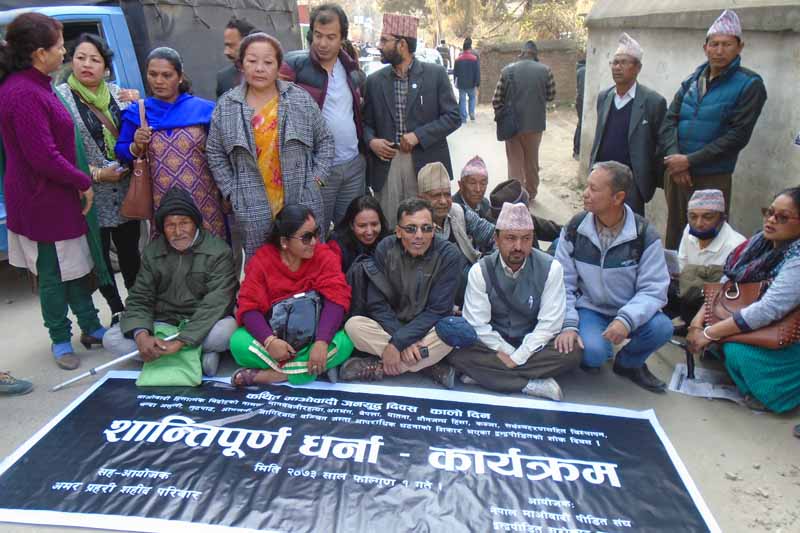CIEDP seeks one-year extension
Kathmandu, January 31
Following assurances from top political leaders that they will ‘extend every possible support’ in the investigation process, the Commission of Investigation on Enforced Disappeared Persons today wrote to the Ministry of Peace and Reconstruction, seeking extension of its tenure by one year as provisioned in the ordinance authenticated by President Bidhya Devi Bhandari on January 19.
The ordinance provisions that the government can extend the tenure of the Truth and Reconciliation Commission and the CIEDP by one year if the two transitional justice mechanisms request for the same stating valid reasons for their failure to complete their jobs in the stipulated time.
On January 25, the peace ministry had dispatched a letter to the TRC and the CIEDP asking them to apply for a term extension ‘if needed’. Spokesperson for the ministry Ram Prasad Bhattarai had told THT last week that the ministry would table a proposal in the Cabinet for term extension stating the reasons given by the TRC and the CIEDP for their failure to complete their jobs in the stipulated time.
In the letter forwarded to the ministry, CIEDP has stated that it failed to complete investigation in the stipulated time, as the Enforced Disappearances Enquiry, Truth and Reconciliation Commission Act 2014 was not amended in line with the Supreme Court ruling and the government had failed to provide adequate human and financial resources, according to Mallick.
The CIEDP took a decision to seek extension after consulting Prime Minister Sher Bahadur Deuba, CPN-UML Chairman KP Sharma Oli and CPN-Maoist Centre Chairman Pushpa Kamal Dahal in the past week.
“The three top leaders have assured us of every possible support to successfully complete the ‘last remaining task’ for the logical conclusion of the peace process,” said CIEDP Chairman Lokendra Mallick. “That’s why we decided to seek term extension. But we won’t be able to work effectively if the government fails to extend us necessary support as promised.”
During the meetings, the CIEDP members had conveyed to the three leaders that they would not be able to complete investigation even in the extended time if their concerns were not addressed, according to CIEDP Spokesperson Prof Bishnu Pathak. “Top political leaders have assured us that they will address all our concerns,” he said.
In the letter forwarded to the ministry, CIEDP has stated that it failed to complete investigation in the stipulated time, as the Enforced Disappearances Enquiry, Truth and Reconciliation Commission Act 2014 was not amended in line with the Supreme Court ruling and the government had failed to provide it with adequate human and financial resources, according to Mallick.
The commissions were formed in 2015 with a two-year term to investigate conflict-era human rights violations. They were awarded the first one-year extension in February 2017. Their extended tenure is set to expire on February 10. Conflict victims welcomed the move to extend the tenure, but said the commission should accomplish its task in a responsible manner in the extended time.
“We welcome the extension if the CIEDP comes up with a clear roadmap for full investigation of every case, establishing truth to give a satisfied answer to the families, creating environment for justice, protecting evidences and framing comprehensive reparation measures considering family profiles and needs,” said Ram Kumar Bhandari, president of the National Network of Families of the Disappeared and Missing Persons.
Of the total 3,093 complaints received, the CIEDP has recommended 2,258 complaints for detailed investigation after completing preliminary investigation. Detailed investigations have begun into around 200 complaints.






